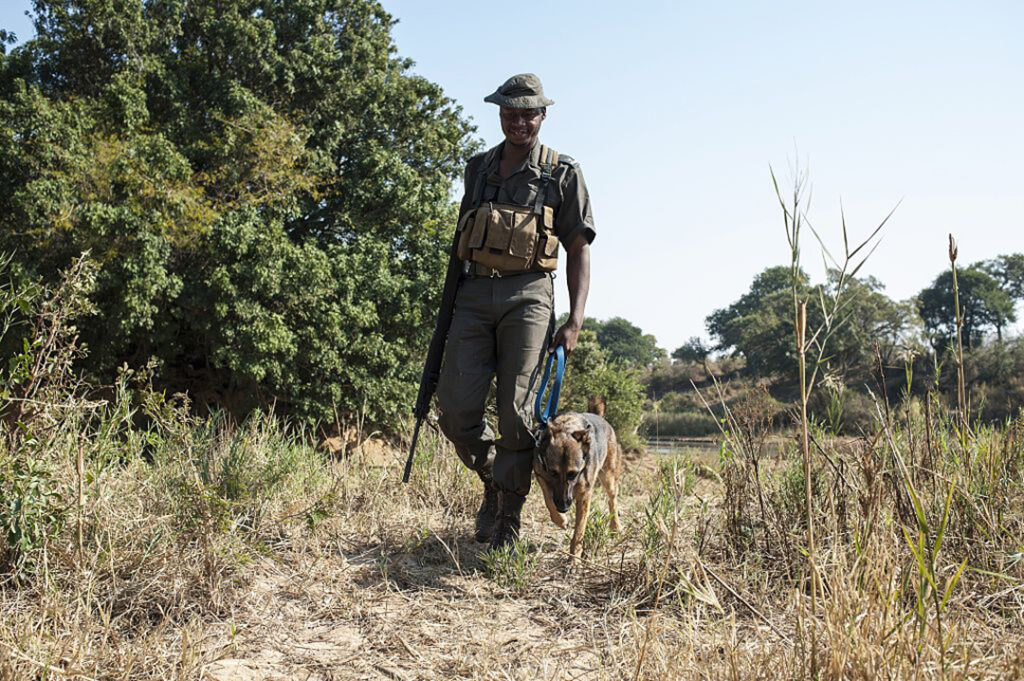ADF STAFF
Highly trained dogs recently helped arrest three poachers suspected of killing rhinos in South Africa’s Kruger National Park.
Rangers in helicopters spotted one dead rhino and an injured rhino after tourists alerted them to gunshots in the park in June. They dispatched rangers and K-9 units. The dogs picked up the scent of three Mozambican nationals armed with a high-caliber hunting rifle, ammunition and horns from three rhinos, France 24 reported. They quickly arrested the suspected poachers.
In South Africa, home to 80% of the world’s rhino population, K-9 units play an important role in combating poaching. South African rhino horns often are trafficked to Asia, where they are ground into powder and used in traditional medicines.
Johan de Beer, a K-9 unit manager at Kruger National Park, told South African news website Independent Online that 95% of poaching arrests there are made with the help of tracker dogs.
The apprehension rate of suspected poachers by rangers alone is 3% to 5%, according to the South African Wildlife College. When rangers are paired with dogs — capable of tracking suspects over rough terrain, grassy plains and desert-like conditions — the apprehension rate increases to 54%.
The dogs can do almost anything related to on-the-ground anti-poaching work, Dennis Kelly, a section ranger at Hluhluwe iMfolozi Park in
“They can be used to follow suspects that are setting snares, and they can look for snares,” Kelly said. “They’re not specifically trained just to follow a suspect that’s looking for rhino. They can follow any human scent that they are given. Their very sensitive noses make it a lot easier to track suspects before they shoot a rhino.”
Still, the rhino population at Kruger National Park has fallen dramatically due to poaching. The park’s estimated count in 2021 was 3,529 white rhinos and 268 black rhinos, down more than half compared to 2013, according to the nonprofit organization Save the Rhino International.
In 2021, 451 rhinos were killed in South Africa, marking the first time in six years that the country recorded an increase in rhino poaching incidents. Since 2020, rhino poaching in the country increased 13%, the organization reported.
The work is dangerous for the dogs and their human handlers, even when they are not on duty.
On July 28, Anton Mzimba, 42, head ranger at the privately run Timbavati game reserve on the boundaries of Kruger National Park, was fatally shot outside his home, and his wife was “gravely wounded” by three gunmen, Agence France-Presse reported. Mzimba reportedly received death threats before the shooting.
Earlier this year, Mzimba participated in a documentary on rhino poaching. South Africa’s government said his murder highlighted the daily dangers faced by rangers.
K-9 handlers in the Hill documentary sometimes spoke on camera with their faces blurred and used only one name. During one scene, a Hluhluwe iMfolozi Park ranger known as Tyson lauded the anti-poaching prowess of his K-9 Kilalo, a Doberman-bloodhound mix that has helped make more than 285 arrests in six years.
Tyson said he and Kilalo recently were deployed to an area where suspected poachers entered the park. Within moments, Kilalo picked up their scent and the pair tracked it for up to 300 meters. Before long, Tyson was communicating with other rangers.
“Contact! Contact! Contact!” he shouted on his radio. “We found one person with a rifle.”
“Roger,” came the response. “We are sending the chopper reaction team. We’re on the way.”
Kilalo helped arrest a suspected poacher who had a backpack containing a loaded rifle, ammunition and two large knives.
The suspect was “ready to stay for three nights in the park,” Tyson said. “They won’t [leave the park] without the rhino horn.”

